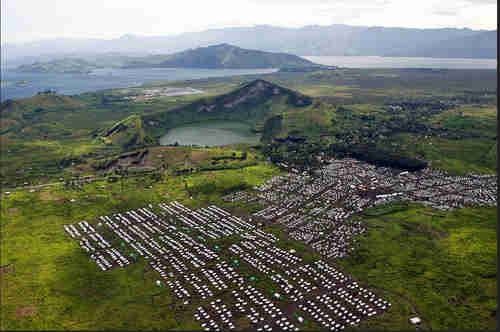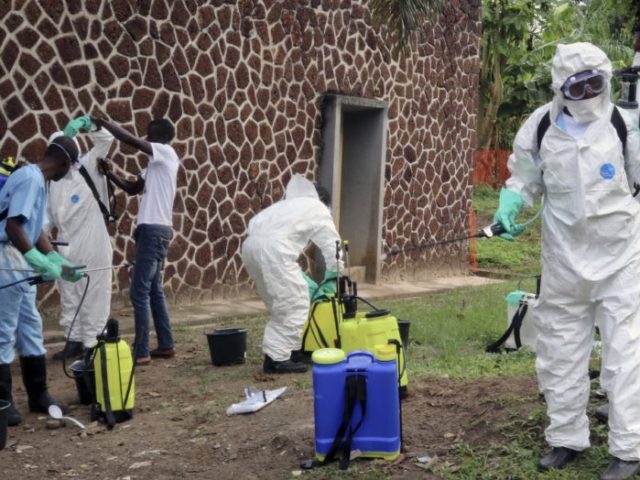This morning’s key headlines from Generational Dynamics:
- DR Congo’s last Ebola outbreak officially ended on July 24
- DR Congo has new outbreak of Ebola in North Kivu province
- Reasons for quick containment of last Ebola outbreak
DR Congo’s last Ebola outbreak officially ended on July 24

Camps for displaced people North Kivu province, DR Congo (UN)
As we reported in May, there was a potentially explosive outbreak of Ebola in the city of Mbandaka, a large heavily populated urban city of about 1.2 million people in the Democratic Republic of Congo (DRC), where an outbreak could spread rapidly. Furthermore, Mbandaka is a port city on the Congo River, creating the potential of transmission along the Congo River to other cities and other countries.
On July 24, the World Health Organization (WHO) was proud to announce that the outbreak had officially ended. The doctors who had been sent to the region had been extremely vigilant and aggressively used “contact tracing” to prevent the virus from spreading. When an Ebola patient is identified, then all that person’s contacts and contacts of contacts are tracked down, and are warned to remain indoors for an incubation period of 21 days.
A vaccine had been developed, and suspected victims were treated with the vaccine, to prevent development of the full virus. Teams went to remote villages to vaccinate some 3,300 people likely to have been exposed to Ebola. However, it is still not known whether the vaccine actually protected against infection, although it clearly boosted morale.
On July 24, all known contacts had completed their 21 day isolation period and there were no new cases. There had been 53 cases of Ebola and 29 deaths.
This was a striking contrast to the Ebola epidemic in West Africa from 2014 to 2016, sickening over 28,000 and killing over 11,310. Guardian (24-Jul) and Science Magazine (18-Jul) and World Health Organization (24-Jul)
DR Congo has new outbreak of Ebola in North Kivu province
The last outbreak of Ebola occurred in the far western region of Equateur province which is in far western Democratic Republic of Congo (DRC).
Now the World Health Organization (WHO) is declaring a new outbreak. This one is in North Kivu province, in far eastern DRC, 2,500 km (1,500 miles) from the previous outbreak.
The new outbreak has been spreading rapidly. Already, 20 people have been killed, including four health workers, and four other people have tested positive for the virus.
There are three known strains of the Ebola virus: the Zaire strain, the Sudan strain, and the Bundibugyo strain. The last outbreak was the Zaire strain, and the vaccine that had been developed was specific to that strain. Which of the three strains is in the new outbreak has not been identified, but the vaccine can be used only with the Zaire strain.
A more dangerous problem, beyond the possible unavailability of a vaccine, is that that that North Kivu province is a war zone for a tribal civil war. Armed groups backed by government forces have been burning down and pillaging villages; torching houses; shutting down schools, hospitals, and churches; forcefully recruiting young men; abducting and kidnapping innocent citizens; raping women and girls. This has already driven hundreds of thousands of refugees from North Kivu province of DRC into refugee camps in Uganda. ( “13-Feb-18 World View — Thousands of DR Congo refugees pour into Uganda to escape tribal violence”)
The WHO has been rapidly transferring its people and assets from Equateur province, the site of the previous Ebola outbreak, to the site of the current outbreak in North Kivu province. However, it remains to be seen how effective they will be in this midst of an extremely violent tribal war situation. Guardian (London) and Reuters and World Health Organization
Related Articles
- Thousands of DR Congo refugees pour into Uganda to escape tribal violence (13-Feb-2018)
- Congo’s Kabila and Burundi’s Nkurunziza use violence and corruption to stay in power (25-Apr-2018)
- United Nations stunned as peacekeepers are massacred in DR Congo (09-Dec-2017)
- DR Congo’s Joseph Kabila brings the art of power and corruption to new heights (24-Jul-2017)
Reasons for quick containment of last Ebola outbreak
The Ebola outbreak that began in May and ended on July 24 was defeated by the WHO extremely quickly, much more quickly than in the past. There are several reasons for this:
- Health professions in DRC had dealt with Ebola outbreaks in the past and had plenty of experience dealing with them. By contrast, in the West African outbreak from 2014-2016, health professionals had no previous experience with Ebola.
- Although the virus spread to urban Mbandaka, the outbreak was mainly concentrated in rural areas in the region. This prevented rapid transmission.
- Medical professionals have developed a number of effective strategies for containing Ebola outbreaks. These include educating people about washing hands and avoiding personal contact. And “contact tracing” is very effective for preventing a sick person from infecting other people.
- Acceptance of the vaccine among the locals in DRC was very high. Although it is not known whether the vaccine actually prevented infection, it did significantly boost morale.
- There were vivid recent memories of the 2014 Ebola outbreak. In 2014, it was a long time before anyone even considered the problem serious. That was not true in the recent outbreak.
The new outbreak, which takes place in the midst of a tribal civil war, may not be as easy to contain. And if it is, then the next big disease outbreak may be from an unknown pathogen that can’t be contained with existing strategies. Vox
Related Articles
- New Ebola outbreak in major DR Congo city is called potentially ‘explosive’ (18-May-2018)
- West Africa at significant economic risk as Ebola panic intensifies (16-Aug-2014)
- World Health Organization says Ebola outbreak is ‘in decline’ (30-Oct-2014)
- Forecasting the Ebola endgame and Global Risk (19-Oct-2014)
KEYS: Generational Dynamics, Democratic Republic of Congo, DRC, Ebola, Mbandaka, World Health Organization, WHO, Equateur province, North Kivu province, Zaire strain, Sudan strain, Bundibugyo strain
Permanent web link to this article
Receive daily World View columns by e-mail

COMMENTS
Please let us know if you're having issues with commenting.